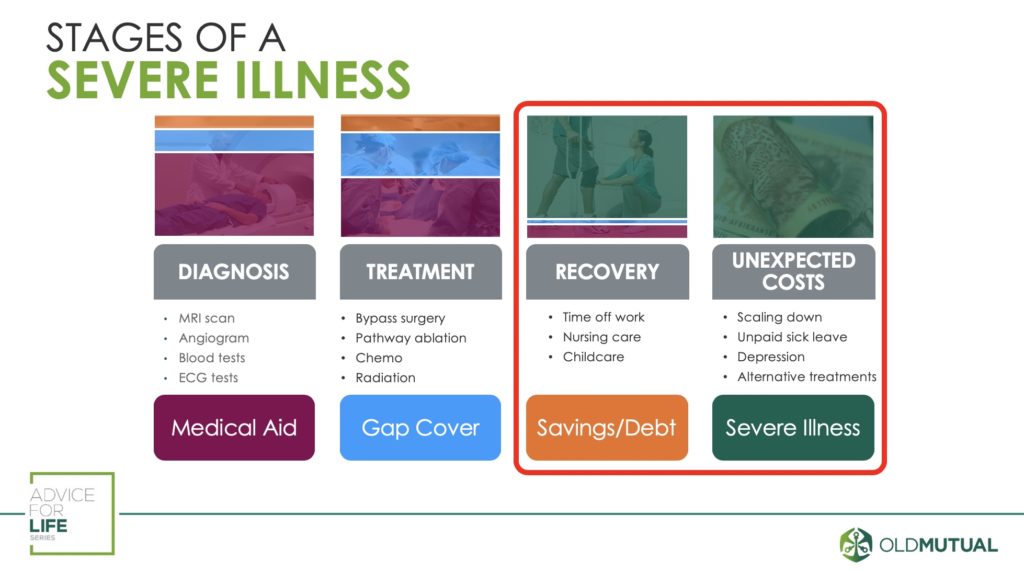Lizl Budhram, Head of Advice at Old Mutual Personal Finance
The Covid-19 pandemic has wrought a heavy toll, both emotionally and financially on South Africans but according to the 2021 Old Mutual Savings and Investment Monitor, it has had the welcome effect of making many revise their attitude towards their money.
87% of respondents said that Covid-19 has made them rethink the way they think about and manage their finances, while 68% have started saving on a regular basis in the last year.
Old Mutual’s claims stats reflect that the Big Four illnesses (cancer, heart attacks, strokes, and coronary artery bypass grafts) contributed to 70% of the illness claims paid in 2020, with cancer still reflecting the largest proportion. This simply highlights the extreme relevance of severe illness cover in the current climate and the truth is many clients are reassessing their level of risk cover.
The risk landscape has shifted. When you look at risk cover, you have life insurance and funeral insurance on the one hand, both of which take effect after you pass away. On the other hand, you have your medical scheme membership, gap cover, disability insurance and severe illness cover, which make up a suite of solutions that can address any medical condition occurring during your lifetime.
A quantitative survey by Digital Insights South Africa in July 2021 revealed that, severe illness product ownership has the lowest take-up out of the various personal risk products. Consumers who typically have severe illness cover appear to be more mature financially. They are also more likely to be 30 – 50-year-old males, earning R60 000 – R79 999. However, since the start of the lockdown, there has been increased ownership for severe illness cover (15%), driven largely by 25- to 29-year-old, blackconsumers in the R40 000 to R59 999 income bracket.
There is also a large portion of the market that earn a significant income, for example, the self-employed bracket, who may not have severe illness cover although they may have an increased need for it as they don’t have any sick leave benefits.
WHERE DOES SEVERE ILLNESS COVER FIT IN?
Now is the ideal opportunity for advisers to help customers understand the relevance of severe illness and disability cover. To customers, severe illness cover can be a bit more complicated and daunting than life insurance. Now is the time to really explain to clients how these benefits fit into their personal financial plan

“87% of respondents said that Covid-19 has made them rethink the way they think about and manage their finances.”
Typically, when clients have a severe illness, there are four stages with different cost implications and different risk cover kicks in at different stages.
Diagnosis: This stage is typically covered by your medical scheme. “There is a sliver of costs that most people plan to cover themselves and they can generally afford that.”
Treatment: At this stage Your medical scheme starts to play a more significant role and, however, there is usually a bigger out-of-pocket aspect, which can be addressed with gap cover.
Recovery: “This is when severe illness cover comes to the fore. During the recovery phase, you may be looking at making changes to your home and car, plus other lifestyle adjustments like full time childcare, out of hospital therapy, a qualified health carer for yourself etc. Don’t underestimate these expenses.
You may find that you are covered adequately during diagnosis and treatment but it’s the tail end of the process where severe illness comes to the fore,” Budhram cautions.
Unexpected costs: It is typically only when you have completed treatment that longer-term implications may set in, such as being unable to return to work in the short to medium term; depression, ongoing medical costs, and possibly having to go into early retirement. “You may find that you are covered adequately during diagnosis and treatment but it’s the tail end of the process where severe illness cover really comes to the fore,” she says.
Severe illness cover is a critical aspect of your income protection. Going forward post recovery, it is not uncommon to find that you really need income protection to keep your regular expenses covered, particularly if you are further away from retirement.


